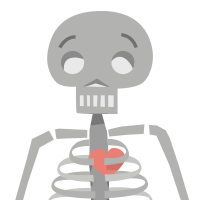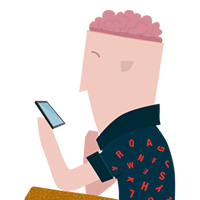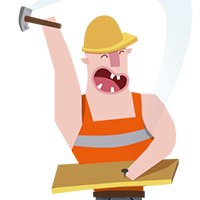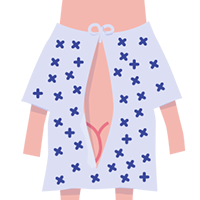
Swelling around the bone is one possible symptom
Bone Cancer
Bone Cancer (or bone tumours), this one’s pretty rare – in fact, only 2 out of every 1,000 Cancer cases diagnosed are Bone Cancer.
Despite being a rare Cancer, Bone Cancer affects more men than it does women.
Primary Bone Cancer is where bone tumours have started in the bone, rather than developing elsewhere and the spreading to the bone afterwards.
Cancers that start in the bone marrow are not included here (e.g. Leukaemia, Lymphoma and Myeloma) as the bone marrow has different functions to the main bone so is seen as separate to Cancers of the Bone.
1,200 Around 1,200 men are diagnosed with Bone Cancer in the UK every yea
4 of 10 Bone tumours can develop at any age, but are more common in older people, with around 4 out of 10 cases being diagnosed in people 65+
14% Of bone tumours occur in children, teenagers and young adults (up to 24 years old)
5 years More than 4 in 10 males diagnosed with Bone Cancer survive at least 5 years
Prevention
While it’s definitely good that Bone Cancer is rare, one downside to this means that doctors and science folk haven’t had the chance to really understand it. So because of this there aren’t many known causes of Bone Cancer.
However, some of the risk factors include:
- Fast-growing bones
- Previous exposure to high doses of radiation
- Paget’s disease of the bone
Symptoms
The symptoms of Bone Cancer can vary from person to person as they can depend on the size of the Cancer and where exactly it is on the body.
Common symptoms can include:
- Pain or tenderness in the area of the tumour
- Swelling around the bone
- Problems moving
- Unexplained tiredness
- A high temperature or sweats
- Unexplained weight loss
Some of these symptoms can be caused by other conditions, so if you find yourself with any of the above it doesn’t mean that you have Cancer. But, it is worth getting yourself down to a doctor to get checked out as you’ll want to treat whatever the problem is as soon as you can.
MOT
When you visit your GP, they’ll first examine the area and bone that are causing you problems. They may take a blood sample which will help test for other conditions – meaning they can confirm or rule out other problems (such as infections or some types of arthritis) that could be causing your symptoms.
If the GP suspects it could be Bone Cancer (or they’re unable to confirm what the issue is from the blood test), you may be referred for an X-ray or MRI scan to investigate further. These tests won’t need you to stay overnight in the hospital.












